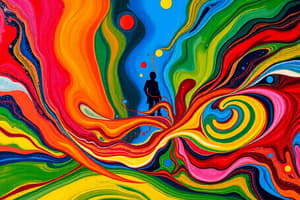Podcast
Questions and Answers
What is the foundation of our universe?
What is the foundation of our universe?
- Matter (correct)
- Atoms
- Elements
- Quarks and leptons
How do atoms combine to form molecules?
How do atoms combine to form molecules?
- By magnetic forces
- By electromagnetic forces
- By gravitational forces
- By the strong and weak forces (correct)
What defines solids from liquids and gases?
What defines solids from liquids and gases?
- They have a defined shape (correct)
- They take the shape of their container
- They expand to fill the space they are in
- They have a defined volume
What happens in a physical change of matter?
What happens in a physical change of matter?
What is plasma?
What is plasma?
In what way do gases differ from solids and liquids?
In what way do gases differ from solids and liquids?
What is the exotic state of matter believed to exist in the early universe and in the cores of stars?
What is the exotic state of matter believed to exist in the early universe and in the cores of stars?
Which substance, making up approximately 27% of the universe's mass-energy budget, does not interact with light or other electromagnetic radiation?
Which substance, making up approximately 27% of the universe's mass-energy budget, does not interact with light or other electromagnetic radiation?
What mysterious substance is believed to make up approximately 68% of the universe's mass-energy budget?
What mysterious substance is believed to make up approximately 68% of the universe's mass-energy budget?
Which concept is responsible for the accelerating expansion of the universe?
Which concept is responsible for the accelerating expansion of the universe?
What is the fundamental substance of our universe that can exist in various states including solid, liquid, gas, plasma, and Bose-Einstein condensates?
What is the fundamental substance of our universe that can exist in various states including solid, liquid, gas, plasma, and Bose-Einstein condensates?
What percentage of the universe's mass-energy budget is believed to be made up of dark matter and dark energy combined?
What percentage of the universe's mass-energy budget is believed to be made up of dark matter and dark energy combined?
Flashcards are hidden until you start studying
Study Notes
Matter is defined as any substance that has mass and occupies space. It is the foundation of our universe, encompassing everything from people to planets. Matter is composed of particles, with the most fundamental particles being quarks and leptons. These particles interact via the strong and weak forces, forming atoms, which in turn form molecules. Atoms combine to form elements, and these elements can then form compounds.
There are three classical states of matter: solid, liquid, and gas. Solids are composed of tightly packed particles that retain their shape even when removed from a container. Liquids are more loosely packed and take the shape of their container while maintaining a constant volume. Gases are the loosest of the three and have neither a defined shape nor volume, expanding to fill the space they are in. These states of matter can transition directly into each other, and under extreme conditions, other states can form, such as plasma, a highly charged state of matter, and Bose-Einstein condensates, a state of matter formed at ultra-low temperatures.
Matter can change forms through physical or chemical processes. Physical changes occur without breaking or forming bonds, while chemical changes involve breaking and forming new bonds, leading to new compounds with different properties. For example, a solid might melt to become a liquid, a liquid might evaporate to become a gas, or particles might combine to form a new compound with different properties.
In addition to the states of matter we are familiar with, there are also exotic states of matter, such as quark-gluon plasma, which is believed to exist in the early universe and in the cores of stars. These states of matter are formed under extreme conditions and have unique properties.
Despite the vast amount of matter in the universe, only a small fraction of it is visible. The majority of matter in the universe is in the form of dark matter, a mysterious substance that does not interact with light or other electromagnetic radiation, making it difficult to detect. Dark matter is believed to make up approximately 27% of the universe's mass-energy budget. Another mysterious substance is dark energy, which is believed to make up approximately 68% of the universe's mass-energy budget. Dark energy is responsible for the accelerating expansion of the universe.
In conclusion, matter is the fundamental substance of our universe, encompassing everything from the smallest subatomic particles to the largest galaxies. It can exist in various states, including solid, liquid, gas, plasma, and Bose-Einstein condensates, and can undergo physical and chemical changes. Despite our understanding of matter, there are still many mysteries to unravel, such as the nature of dark matter and dark energy.
Studying That Suits You
Use AI to generate personalized quizzes and flashcards to suit your learning preferences.




